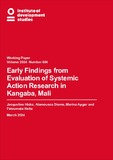Early Findings from Evaluation of Systemic Action Research in Kangaba, Mali
Premiers résultats d'une évaluation de recherche-action systémique au Kangaba, Mali
| dc.contributor.author | Hicks, Jacqueline | |
| dc.contributor.author | Dioma, Alamoussa | |
| dc.contributor.author | Apgar, Marina | |
| dc.contributor.author | Keita, Fatoumata | |
| dc.coverage.spatial | Mali | en |
| dc.date.accessioned | 2024-04-24T13:56:45Z | |
| dc.date.available | 2024-04-24T13:56:45Z | |
| dc.date.issued | 2024-04-24 | |
| dc.identifier.citation | Hicks, J.; Dioma, A.; Apgar, M. and Keita, F. (2024) Early Findings from Evaluation of Systemic Action Research in Kangaba, Mali, IDS Working Paper 604, Brighton: Institute of Development Studies, DOI: 10.19088/IDS.2024.016 | en |
| dc.identifier.citation | ||
| dc.identifier.citation | Hicks, J. ; Dioma, A. ; Apgar, M. et Keita, F. (2024) Premiers résultats d’une évaluation de recherche-action systémique au Kangaba, Mali, IDS Working Paper 605, Brighton : Institute of Development Studies, DOI : 10.19088/IDS.2024.019 | fr |
| dc.identifier.isbn | 978-1-80470-187-4 | |
| dc.identifier.isbn | 978-1-80470-196-6 | fr |
| dc.identifier.issn | 2040-0209 | |
| dc.identifier.uri | https://opendocs.ids.ac.uk/opendocs/handle/20.500.12413/18306 | |
| dc.description.abstract | This paper presents early findings from evaluation research embedded in a community-driven peace-building project implemented in Mali. Called the ‘Vestibule of Peace’, the project uses Systemic Action Research (SAR) to first support diverse members of selected local communities to collect and analyse life stories through mapping the systemic drivers of conflict. This causal analysis then motivates the generation of collective solutions to selected drivers through facilitated action research groups (ARGs). The SAR approach as an alternative, participatory approach to peace-building aims to engage and empower local actors to build their agency as they define and negotiate innovative pathways to achieve everyday peace. The overarching evaluation design of the Vestibule of Peace project uses contribution analysis as its overarching approach, with multiple methods exploring specific ‘causal hotspots’. This paper presents the results of in-depth case studies of ARGs as part of the SAR approach in the Kangaba region in Mali. This is one method used within the contribution analysis design which aims to describe the context, mechanisms, and dynamics of a selection of ARGs. The data sources come from documentation of the ARG processes by ARG members and project staff, interviews and reflection sessions with the participants and facilitators. After describing the internal processes of the groups, the paper then draws together a contribution narrative to share comparative findings of how the ARG processes worked for whom in what context. | en |
| dc.description.abstract | Cet article présente les premiers résultats d’une recherche d’évaluation intégrée dans un projet communautaire de consolidation de la paix mis en œuvre au Mali. Appelé « Vestibule de la paix », le projet utilise la recherche-action systémique (SAR) pour aider dans un premier temps divers membres de communautés locales sélectionnées à recueillir et analyser des récits de vie en traçant les moteurs systémiques du conflit. Cette analyse causale motive ensuite la génération de solutions collectives à certains moteurs à travers des Groupes de Recherche-Action facilités (GRA). L’approche SAR, une approche alternative et participative à la consolidation de paix, vise à impliquer et à donner aux acteurs locaux les moyens de renforcer leur capacité d’agir alors qu’ils définissent et négocient des voies innovantes pour parvenir à la paix au quotidien. La conception globale de l’évaluation du projet Vestibule de la Paix utilise l’analyse des contributions comme principale approche d’évaluation, utilisant plusieurs méthodes pour explorer des « point chauds causals » spécifiques. Cet article présente les résultats d'études de cas approfondies de GRA dans le cadre de l'approche SAR dans la région de Kangaba au Mali. Il s'agit d'une méthode utilisée dans la conception de l'analyse de contribution qui vise à décrire le contexte, les mécanismes et la dynamique d'une sélection de GRA. Les sources de données proviennent de la documentation des processus GRA par les membres du GRA et l’équipe du projet, d'entretiens et de séances de réflexion avec les participants et les facilitateurs. Après avoir décrit les processus internes des groupes, l'article rassemble ensuite un récit de contribution pour partager des résultats comparatifs sur la façon dont les processus GRA ont fonctionné pour qui et dans quel contexte. | fr |
| dc.description.sponsorship | Humanity United | en |
| dc.language.iso | en | en |
| dc.publisher | Institute of Development Studies | en |
| dc.relation.ispartofseries | IDS Working Paper;604 | |
| dc.rights | The paper is distributed under the terms of the Creative Commons Attribution 4.0 International licence (CC BY), which permits unrestricted use or distribution in any medium, provided the original authors and sources are credited and any modifications or adaptations are indicated. | en |
| dc.rights.uri | http://creativecommons.org/licenses/by/4.0/ | en |
| dc.subject | Participation | en |
| dc.subject | Security and Conflict | en |
| dc.title | Early Findings from Evaluation of Systemic Action Research in Kangaba, Mali | en |
| dc.title | Premiers résultats d'une évaluation de recherche-action systémique au Kangaba, Mali | fr |
| dc.type | IDS Working Paper | en |
| dc.rights.holder | Institute of Development Studies | en |
| dc.identifier.team | Participation | en |
| dc.identifier.doi | 10.19088/IDS.2024.016 | |
| dc.identifier.doi | 10.19088/IDS.2024.019 | fr |
| dcterms.dateAccepted | 2024-04-24 | |
| rioxxterms.funder | Default funder | en |
| rioxxterms.identifier.project | Default project | en |
| rioxxterms.version | VoR | en |
| rioxxterms.versionofrecord | 10.19088/IDS.2024.016 | en |
| rioxxterms.funder.project | e4b8632d-62dd-4f31-9936-43860ac26f9a | en |
Files in this item
This item appears in the following Collection(s)
-
IDS Research [1668]
Except where otherwise noted, this item's license is described as The paper is distributed under the terms of the Creative Commons Attribution 4.0 International licence (CC BY), which permits unrestricted use or distribution in any medium, provided the original authors and sources are credited and any modifications or adaptations are indicated.



